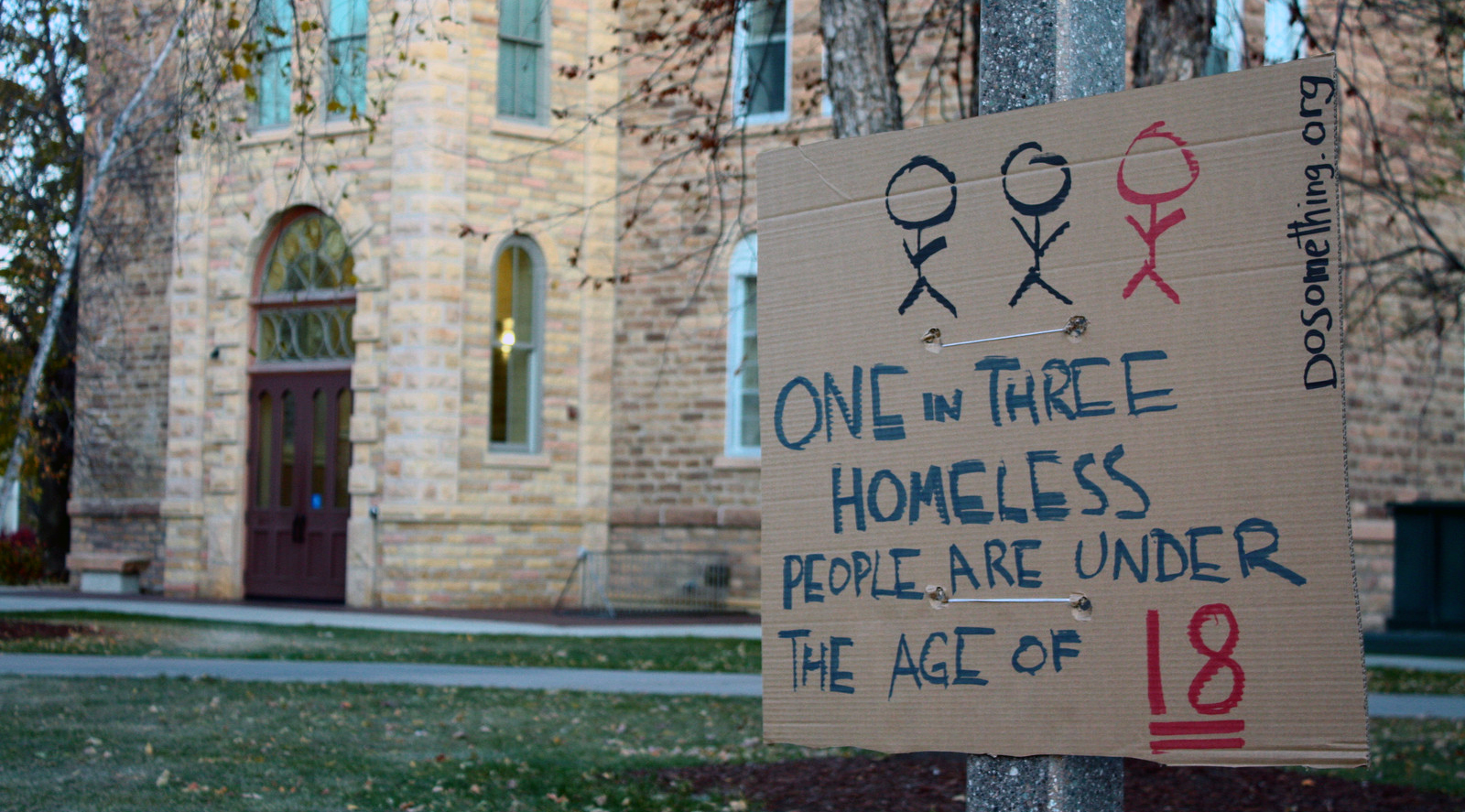Gustavus Adolphus College first-year students are collaborating with Partners for Affordable Housing in the 16th annual sleep out on campus. As an integral part of the First Term Seminar course Politics of Housing and Homelessness, political science professor Richard Leitch leads his first-years through a three-day long sleep out to emulate a homeless experience while also advocating for raised awareness and education on the complexity of the issue of homelessness.
During the semester-long class, the first-year students are exposed to curriculum focused on the realities of homelessness, poverty, and the lack of affordable housing across the country. Through films, books, and their own research the students investigate the many factors, symptoms, and effects of the complicated social issues that go far beyond the stereotypes assigned to homeless people.
Sam Kast, one of the students in the course, grew up in Hudson, Wis. where his experience and awareness of the issue of homelessness was limited. Engaging with the class material and taking advantage of the independent research opportunities has shaped a new understanding.
“This course has opened my eyes to the combined impact of the effects of gentrification, loitering laws, rising housing prices, domestic violence, and more factors on the issue of homelessness,” Kast said. “The need for something to be done to address these issues is greater than I or any average citizen is aware.”

Each year, Leitch invites his students to go further in their understanding of the issue and beyond the academics by participating in the sleep out. For three days, Leitch and his students do not change clothes, shower, use personal technology, sleep in their campus rooms, or purchase food and experience hands on the reality of living without a place to call home each night.
“There is a profound insecurity and negativity that engulfs the reality of living as a homeless person, and by putting oneself in those shoes it creates a true understanding and sense of empathy that can be used for good,” Leitch explained. “I want my students to feel humiliated, vulnerable, and embarrassed because I want them to feel the reality in order to be able to understand at a higher level.”
The participating students are expected to maintain their class schedules and studies and are allowed to sleep in Christ Chapel each night. Finding leftover food in the dining center’s tray return, attempting to sleep in the campus center during the day, and facing stares quickly becomes part of the routine for the first-year students.
“There are young homeless people who are trying to survive and thrive in an academic setting at many different colleges across the country. This is a reality that is so often missed by not only my students, but by most of society,” Leitch said. “Living this reality, if only for a short time, opens the conversation and awareness that this issue deserves and needs.”
The sleep out is designed to not only provide an out of the classroom experience for the first-year students investigating homelessness, but it also serves as an advocacy for education and support. The night before the event begins, the students create and hang cardboard signs across campus. In order to incite intentional reflections and realizations in the Gustavus community, each sign bears a statistic, question, or statement about homelessness or affordable housing issues.

In addition to his or her belongings for the three days, each student in the sleep out also carries a cardboard box to collect donations of necessities and money from other Gustavus students and faculty. Furthermore, the class partners with the Gustavus Book Mark in order to raise more funds by creating an event sweatshirt and allowing all Gustavus students to purchase packages of necessities to be donated. At the end of the sleep out, the students donate all of the items collected and the money raised to two Partners for Affordable Housing shelters in Mankato, the Welcome Inn and the Teresa House.
At the conclusion of the sleep out, the students and their professor return to their normal routines. As Leitch stresses and as Kast and his peers will come to understand, this is where the sleep out becomes only a simulation because in reality there is often no clear and safe end to the daily struggle. The complexity of the issue cannot be addressed in a one-size-fits-all solution.
However, the experience in the class educates and ignites new thinking. Seeking a career in politics, Kast’s experiences in the class have provided a broadened perspective for his future goals.
“The people who live under these conditions and without homes are not represented in the government where the very solutions they need can happen because political leaders are only incentivized by the tax-paying homeowners,” Kast said. “It deserves more attention at a higher level and I will certainly keep it with me.”
Fortunately for the first-year students, they do not have to look far to find an example of a community actively working to combat some of those factors affecting homelessness. The city of Saint Peter has multiple sections of affordable housing units and intentionally focuses the organization of the community to create better conditions for these areas. Following the sleep out, the class will be visited by Saint Peter City Administrator Todd Prafke and will visit the community and the affordable housing developments.
For more information about Partners for Affordable Housing, the Welcome Inn, and Teresa House, visit the organization’s website.

Leave a Reply
You must be logged in to post a comment.